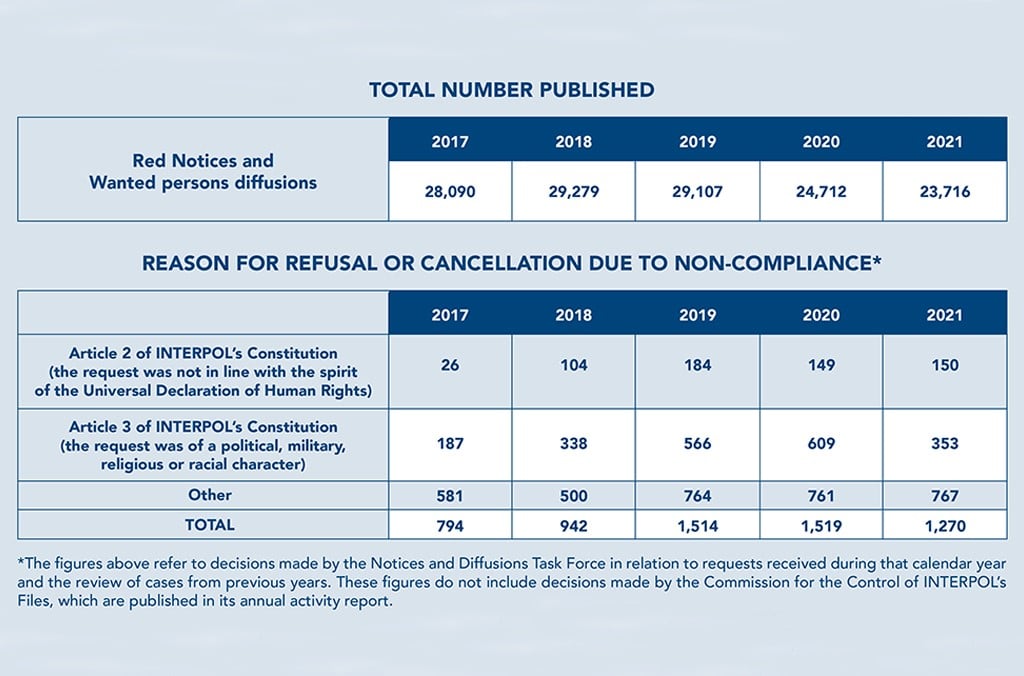| Case Citation | Facts* | Holding* |
|---|
| Due process concerns with the admission of Red Notices in the context of asylum and removal proceedings |
| Hernandez Lara v. Barr, 962 F.3d 45 (1st Cir. 2020) | Respondent appeared pro se in removal proceedings despite diligent attempts to secure counsel. She petitioned for review on the basis of her denied right to counsel. In the context of her appeal to the BIA, Respondent attempted to use the Red Notice for her arrest from El Salvador as evidence of changed circumstances to permit the filing of her asylum application beyond the one-year deadline. The BIA refused to review this argument since it had not been timely raised before the Immigration Judge. | Respondent’s petition is granted. The Court concludes that the outcome of the case would have been altered if the Respondent had access to counsel. The Court finds that the Respondent would have timely raised her changed circumstances argument before the Immigration Judge.The Court additionally repeats the Department of Justice’s view that a Red Notice alone is an insufficient basis to arrest someone “because it does not meet the requirements for arrest under the 4th amendment to the Constitution.” See INTERPOL Washington: Frequently Asked Questions, U.S. Dep’t of Justice, https://www.justice.gov/interpol-washington/frequently-asked-questions (last visited January 10, 2023). |
| Radiowala v. Att’y Gen. U.S., 930 F.3d 577 (3d Cir. 2019) | Respondent submitted a petition for review of the denial of his asylum application and CAT claims. INTERPOL issued a Red Notice for the Respondent’s arrest prior to his placement in removal proceedings. The Red Notice was not considered by the BIA in the review of the Respondent’s claims. | The Third Circuit holds the Respondent to be ineligible for asylum and protection under CAT on grounds unrelated to the Red Notice issued against him. In footnote 1, the Court states that it “give[s] no weight to the existence and content of the Red Notice.” Moreover, the Court references Congress’s view that Red Notices cannot serve as an independent basis for removal as well as the Department of Justice’s view that Red Notices do not comply with the requirements of the Fourth Amendment to the U.S. Constitution related to lawful arrests. |
| Bulatov v. Att’y Gen. U.S., 524 Fed. Appx. 848 (3d Cir. 2013) | Respondent appealed a BIA denial of his motion to reopen his defensive asylum, withholding, and CAT claims. A Red Notice from Kazakhstan was introduced by the government as evidence in the removal proceedings. It identified the Respondent as a possibly dangerous fugitive wanted for prosecution (charged with multiple murders). | The Court denies the Respondent’s petition for review. It finds no prejudice to the Respondent in the admission of the Red Notice as evidence. It holds there is enough evidence on the record in addition to the Red Notice to deny asylum, withholding, and CAT protections. |
| Due process concerns with the admission of Red Notices at bond hearings (flight risk assessment) |
| Malam v. Adducci, 2020 WL 5891394 (slip copy) (S.D. Mich. 2020) | Review of a bail application. Respondent’s bond was denied because he was determined to be a flight risk based on a Red Notice from Jordan. | The Court grants the Respondent’s bail, concluding that he is not a flight risk. The Court holds that the Red Notice diminishes the Respondent’s flight risk because it significantly limits his ability to travel internationally. |
| Torres Murillo v Barr, 2019 WL 8723753 (N.D. Cal. 2019) | Respondent’s visa was revoked, and he was placed into removal based on a Red Notice from Honduras for murder. Respondent was thereafter denied release on bond because he was deemed to be a flight risk. The Immigration Judge considered the Respondent a flight risk because it did not believe the Respondent would abide by a deportation order to Honduras given the significant criminal charges he faced there (as evidenced in the Red Notice). | The Court acknowledges that a Red Notice alone without supporting evidence does not provide “a sufficient basis for the arrest of a subject because it does not meet the requirements for arrest under the 4th Amendment.” It, however, also cites the finding in Kharis v. Sessions that “it does not violate due process to give a Red Notice at least some weight in the context of determining whether a detainee poses a flight risk.” The Court thus holds that the Red Notice formed a sufficient basis for establishing that the Respondent posed a flight risk as a matter of law. It also holds that the Immigration Judge’s determination to deny bond based on the Red Notice did not violate the Respondent’s due process rights because Red Notices may be given some weight in determining flight risk. |
| Kharis v Sessions, 2018 WL 5809432 (N.D. Cal. 2018) | Petition for writ of habeas corpus. Respondent had an active Red Notice against him from Russia. While Respondent was in lawful status, he filed for asylum and disclosed the charges against him in Russia, claiming a reasonable fear based on political persecution. While his application was still pending, USCIS revoked his visa based on the criminal charges against him. ICE determined that custody was necessary because he was a flight risk on account of the Red Notice. Respondent disputed the reliability of the Red Notice and the abuse of the system by Russian authorities. | The Court references previous holdings that a Red Notice cannot serve as an independent basis for an arrest. It nevertheless holds that due process permits reliance on a Red Notice in the context of a bond determination given its relevance to the Respondent’s flight risk. Nevertheless, the Court expresses doubts regarding whether the Red Notice at issue could support a detention finding given evidence on the record related to the unreliability of Red Notices, particularly from Russia. Petition for writ of habeas corpus granted given the agency’s failure to “grapple with a substantial, well-supported argument that Kharis’s Red Notice was at most minimally probative as to whether he was a flight risk.” |
| Borbot v. Warden Hudson County Correctional Facility, 906 F.3d 274 (3d Cir. 2018) | Respondent submitted a writ of habeas corpus after being denied release on bond. Respondent was detained by ICE in 2016 based on a Red Notice issued by Russia for criminal fraud. | Affirms District Court order and finds no due process violation in Respondent’s continued detention notwithstanding the length of the detention and the overwhelming reliance on the Red Notice in the initial removal proceedings. The Dissent engages in a lengthy discussion of Russia’s abuse of Red Notices to persecute its political opponents. Dissenting Judge Roth calls for a new hearing for Respondent based on the Respondent’s political asylum claim, the retraction of the Red Notice during the course of removal proceedings, and the pattern of Red Notice abuse by Russia. |
| Red Notices in the context of the nonpolitical crime bar to asylum [INA § 208(b)(2)(A)(iii)] |
| Matter of W-E-R-B-, 27 I&N Dec. 795 (BIA 2020) | DHS introduced a Red Notice as evidence in the Respondent’s asylum proceedings. The Notice listed the Respondent as the subject of an arrest warrant in El Salvador for “participation in an illicit organization.” Although the Respondent argued that the Red Notice did not have sufficient probative value, he conceded that the criminal charges against him were not political and failed to submit significant evidence to challenge the reliability of the Notice. | The Board equates probable cause with the “serious reason for believing” standard in the serious nonpolitical crime bar to asylum. It accordingly finds that there is probable cause to believe Respondent committed a serious nonpolitical crime given the Red Notice for his arrest for participation in an illicit organization. The Respondent does not carry his burden to refute the finding of probable cause, conceding, in turn, that he is charged with a nonpolitical crime. He, moreover, fails to introduce evidence of the Red Notice’s unreliability. The Court thus holds the Respondent to be barred from asylum under the serious nonpolitical crime bar.Note: Practitioners may argue that Baharona v. Garland (included below) calls for a more onerous standard. |
| Gonzalez-Castillo v. Garland, 47 F.4th 971 (9th Cir. 2022) | Counsel for the U.S. Government introduced a Red Notice as the only evidence that the Respondent had committed a serious non-political crime in El Salvador. The Government argued that providing “some evidence” was enough to shift the burden to the Respondent. | The Court agrees with the 8th Circuit precedent and concludes that the relevant standard for the serious nonpolitical bar to asylum is not the presentation of “some evidence,” but rather a “serious reason to believe,” which must be satisfied by probable cause. Probable cause, moreover, requires a fair probability that the noncitizen committed a serious nonpolitical crime. Thus, a Red Notice cannot by itself establish probable cause. The Court cites to Villalobos Sura (included below) in saying “we have never held that a Red Notice alone is sufficient to constitute probable cause.” The Court remands to consider if the Respondent was eligible for withholding. |
| Gonzales v. Garland, 29 F.4th 989 (8th Cir. 2022). | Review of denial of relief under CAT. Respondents were charged with fraud in Bolivia and a Red Notice was issued for their arrest. During initial proceedings, Respondents filed a request with the Commission for the Control of INTERPOL’s Files (CCF) to delete the Red Notice. This request was granted based on the Notice’s nonconformity with INTERPOL’s technical requirements, and Respondents filed a motion to remand on this ground. | The Court holds that “the [d]eletion of the Red Notices is likewise immaterial” in the review of Respondents’ claims under CAT. As explained by the Court, “Bolivia’s decision to request Red Notices without adhering to the applicable INTERPOL rules does not make it any more likely that [Respondents] will be subject to torture if returned to Bolivia.” The Court accordingly denies the Respondents’ petition.Note: Included in the Court’s analysis is a discussion of the basis for the CCF’s deletion of Red Notices. The Court affords weight to the CCF’s refusal to delete the Notice on the ground of it being predominantly political. While not explicitly stated, deletions based on a finding that the charges are predominantly political could weigh in a court’s consideration, particularly regarding the application of the serious nonpolitical crime bar to asylum. |
| Duralev v. Garland, 2021 WL 374899 (9th Cir. 2021) | Respondent petitioned for review of his asylum application. Russia had issued a warrant for the Respondent’s arrest as well as a Red Notice, alleging fraud. The Respondent introduced evidence regarding Russia’s abuse of Red Notices in its persecution of political opponents. He did not, however, introduce evidence that the Red Notice against him was deficient or issued for political reasons. | The Court considers the Respondent’s evidence, but concludes it is insufficient to carry his burden. While the Respondent offered evidence of Russia’s abuse of Red Notices in the persecution of political opponents, he failed to introduce evidence that the Red Notice issued against him had been done with such motivations. The Respondent thus failed to establish a nexus between the evidence he proffered and his situation. The Court holds that the Respondent is barred from asylum because the arrest warrant and Red Notice are sufficient to establish probable cause that he committed a serious nonpolitical crime. |
| Barahona v. Garland, 993 F.3d 1024 (8th Cir. 2021) | Respondent sought review of a BIA denial of his asylum application. The BIA denied the Respondent’s asylum application based on a Red Notice for his arrest from El Salvador, finding it sufficient to trigger the serious nonpolitical crime bar. The Respondent submitted a letter from an attorney in El Salvador as evidence that the criminal charges against him had been dropped. | The Court holds that the “serious reasons for believing” standard requires a finding of probable cause.
The Court agrees that under 8 C.F.R. § 1240.8, most mandatory bars to relief will apply and the burden will be shifted to the Petitioner if DHS “present[s] some evidence for which a reasonable factfinder could conclude that one or more grounds for mandatory denial of the application may apply.” The Court finds that a Red Notice absent additional evidence is insufficient to meet this standard. Given the genuine dispute as to whether the charges underlying the Red Notice had been dropped, the Court reverses and remands the case for further proceedings. |
| Villalobos Sura v. Garland, 8 F.4th 1161 (9th Cir. 2021) | A Red Notice was issued based on an arrest warrant alleging that the Respondent participated in the murder of four individuals while he was on duty as a member of the El Salvador army. The government submitted the arrest warrant and the Red Notice as evidence. The Respondent testified on his own behalf. The Immigration Judge did not find his testimony to be credible. | The Court finds that an arrest warrant, coupled with a Red Notice, is sufficient to establish probable cause when the Respondent failed to present evidence to negate such documents and whose testimony was, moreover, found to not be credible. The Court finds it unnecessary to decide whether a Red Notice alone is sufficient to establish probable cause. |
| Guan v. Barr, 925 F.3d 1022 (9th Cir. 2020). | Review of denial of asylum, withholding, and relief under CAT. China had issued a Red Notice alleging the Respondent had “illegally received public deposits with high-interest promise . . . knowing that the company did not have the qualification to receive public deposits or grant loans.” The Respondent’s asylum application was barred under the serious nonpolitical crime bar. | The Court is not convinced by Respondent’s claim that the charge against him was political given his concession that he entered the criminal scheme for economic reasons. Moreover, the Court finds substantial evidence to support a finding that the serious nonpolitical crime bar to asylum applies in the Respondent’s case. The evidence consisted of the Red Notice, the warrant for the Respondent’s arrest, as well as his admissions in Court.In addition, while footnote 2 acknowledges that a Red Notice is not an international arrest warrant, it states that “it is the closest instrument to one.” |
| Tatintsyan v Barr, 799 Fed. Appx. 965 (9th Cir. 2020) | Respondent sought review of a BIA denial of his asylum application, withholding of removal, and relief under CAT. The BIA based the denial solely on a Red Notice that did not include a copy of an arrest warrant. Although the Respondent submitted credible testimony that Russian authorities had political reasons for charging him and evidence that Red Notices arising from Russia are unreliable, the BIA determined that there were serious reasons for believing that the Respondent committed a serious nonpolitical crime. | The Court vacates the BIA’s denial of relief and remands the case for consideration of the Respondent’s claim on the merits. The Court finds that the BIA’s holding that there were serious reasons to believe that the Respondent committed a serious nonpolitical crime was not supported by substantial evidence. During the analysis the Court cites to Go v. Holder, 650 F.3d 1047 (9th Cir. 2011), reaffirming that a finding of “serious reasons” is tantamount to a finding of probable cause and that a finding of serious reasons must be affirmed if it is supported by substantial evidence. |
| Contreras-Gonzalez v. Barr, 839 Fed. Appx. 611 (2d Cir. 2020) | Respondent petitioned for review of his asylum denial. Counsel for the U.S. Government introduced a Red Notice from the Dominican Republic to support its claim that the Respondent had committed a serious nonpolitical crime and was thus barred from asylum. The Red Notice was supplemented by evidence that the Respondent was at the scene of the charged crime and his truck was used by the perpetrators. | In a summary order, the Second Circuit affirms the Immigration Judge’s finding that the Respondent’s testimony was not credible based on his implausible retelling of events, failure to explain why he was at the scene of the crime, and his refusal to secure counsel for proceedings in the Dominican Republic prior to the commencement of immigration proceedings. The Court thus finds sufficient evidence on the record to support a probable cause finding that the Respondent committed a serious nonpolitical crime. The Respondent’s petition for review is denied. |
| Marroquin-Retana v. U.S. Att’y Gen., 675 Fed. Appx. 216 (3d Cir. 2017) | Review of BIA denial of asylum, withholding, and relief under CAT. INTERPOL had issued a Red Notice against Respondent for attempted manslaughter in El Salvador. The government submitted evidence beyond the Red Notice that the Respondent had committed the charged crime, including a conviction record, sentencing order, and letter from the Commissioner at the Chief of Police Intelligence Center in El Salvador. The BIA agreed with the Immigration Judge that the Respondent was barred from asylum because the Red Notice provided “serious reason to believe” that he had committed a serious non-political crime. | The Court maintains that the “serious reasons to believe” standard in INA § 208(b)(2)(A)(iii) is equivalent to a finding of probable cause. It accordingly holds that the Red Notice issued at the request of El Salvador, coupled with other significant evidence, is sufficient to trigger the serious nonpolitical crime bar to asylum in the Respondent’s case. |

















